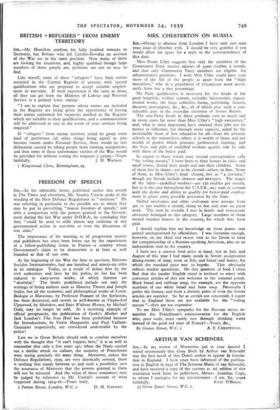MRS. CHESTERTON ON RUSSIA
Snt,—Owing to absence from London I have only just seen your issue of October 27th. I should be very grateful if you would allow me space for a reply to the correspondence of that date.
Miss Freda Utley suggests that only the members of the Communist Party receive salaries of 5,000 roubles a month, and that only Communist Party members are eligible for administrative positions. I wish Miss Utley could have seen more of the life of the people as apart from the "high executives," who in a population of 172,000,000 must neces- sarily form but a tiny percentage.
No Party qualification is necessary for the heads of the great hospitals, welfare centres, scientific laboratories, experi- mental works, the huge collective farms, publishing houses, theatres, newspapers, &c., &c., all of which play such a con- siderable part in the everyday existence of Soviet Russia.
The non-Party heads in these positions earn as much and in many cases far more than Miss Utley's " high executives," and, what is most important, have attained their jobs not by money or influence, but through sheer capacity, aided by the inestimable boon of free education for all—from the primary schools to the universities, where it is wealth of brain and not wealth of pocket which procures professional training, and the boys and girls of unskilled workers qualify side by side with those of the better paid.
In regard to those whom your second correspondent calls " the toiling masses," I have been to their homes in cities and small towns, shared their meals and met their children. Some of them live in slums—yet to be cleared—others in flats. None of them, as Miss Utley's head cleaner, live in " a corridor," though my friends include cleaners and sweepers. The wages of the latter—unskilled workers—are no roubles per month, but as is the case throughout the U.S.S.R., any man or woman with the desire and ability to qualify for better-paid employ- ment is given every possible assistance by the State.
Skilled mechanics and other craftsmen now average from 30o to 500 roubles a month, rising to boo and over on piece work. The men in overalls I met in hotels and restaurants obviously belonged to this category. Large numbers of them owned wooden houses in the country, for which they have paid.
I should explain that my knowledge on these points was gained unchaperoned by officialdom. I was fortunate enough, however, on my third and recent visit to the Soviet to have the companionship of a Russian-speaking American, also on an independent visit to the country.
I have not a current food price at hand, but in July and August of this year I had many meals in Soviet co-operative dining-rooms of soup, meat or fish, and bread and butter, for which the standard price was 5o kopeks. This obviously reflects market quotations. On this question of food I often find that the insular English mind is inclined to reject with contempt articles of diet not welcome to the national palate. Black bread and cabbage soup, for example, are the opposite numbers of our white bread and bone soup. Personally I prefer the former, and from a dietetic point of view the Soviet articles are superior. So far as cereals are concerned, I regret that in Fogland these are not available for the " toiling masses "—they are too expensive.
To me Miss Utley's sympathy for the Russian menu re- sembles the Frenchman's commiseration for the English who, poor souls, must surely rust through drinking water instead of the good red wine of Francel—Yours, ate.,




































 Previous page
Previous page